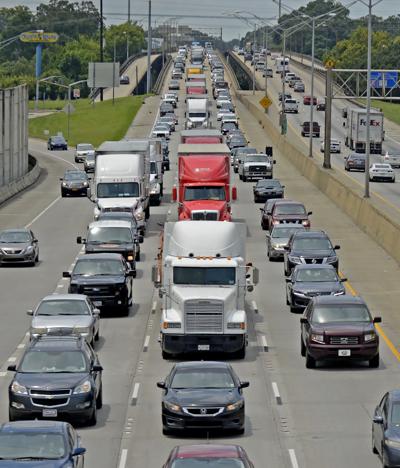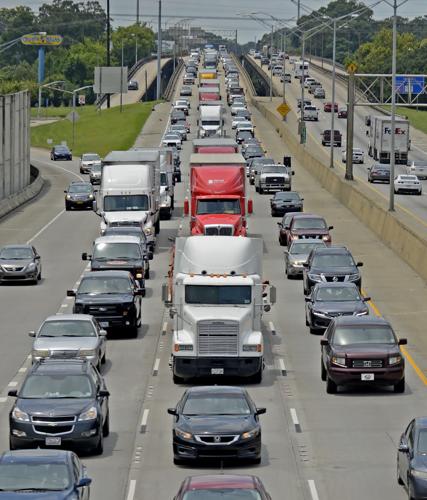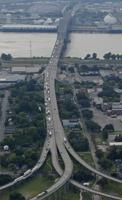The state wants Baton Rouge-area workers to consider carpooling to their jobs to get as many cars as possible off packed roads before another round of construction on Interstate 10 begins.
A total of 1,100 people are signed up to use the capital region's new ride-share app, Commuter Krewe. It remains to be seen whether the latest model will have an appreciable effect on traffic congestion around Baton Rouge. Previous ones haven't.
Advisers to the state Department of Transportation and Development declined to comment on how many of the 1,100 downloaders are actively using the app, saying it's still in the pilot phase. Still, if a ride-sharing program could take 1 percent of cars off the road, it would make a difference, AECOM consultant Derek Chisholm said.
State and regional planning officials unveiled a new push Tuesday to get commuters to try carpooling, transit and other alternative means of g…
Commuter Krewe could just be the beginning. Chisolm and transportation Secretary Shawn Wilson want to install carpool lanes — also known as high-occupancy vehicle, or HOV lanes — though the logistics must be worked out.
Road tolls are also likely to appear at some point in the future, Chisolm said. It can be problematic to enforce, but in some areas, HOV lane users could receive a discount on tolls, he said.
Officials introduced Commuter Krewe in March. It's a collaboration between DOTD and the Metropolitan Planning Commission. Users indicate where they want to go and the app finds nearby drivers and passengers headed the same way. If riders want to split gas money, they have to do it outside Commuter Krewe, though, as it has no payment options.
The program also offers up to four emergency rides home per year to regular users who have to work unexpected overtime, get sick or must rush to care for a family member.
The state has tried to encourage commuter ride-sharing before. Commuter Krewe's predecessor, Geaux Ride, had only about 550 users, and they've been migrated to the new system.
Could Uber factor into the future of city buses?
The new app tracks users' locations and automatically finds nearby riders heading in the same direction, much like Uber or Lyft. In the old version, users had to manually look for carpoolers, Wilson said.
Authorities are hitting concentrated employment areas — state agencies, chemical plants, City Hall — and hoping their leaders encourage their staffs to carpool. Construction crews will soon widen I-10 between the Mississippi River and the I-12 interchange in Baton Rouge, so a reduced traffic volume will help.
In some states, employers are compensated when their staffs carpool at high rates. In others, like Washington, employers could be punished if not enough do, Chisolm said. He expects the Baton Rouge area to hew a middle path, neither paying nor penalizing companies for their carpool rate.
Some companies reward their employees who carpool, though, Wilson said. Though he couldn't recall any local specifics, businesses elsewhere sometimes offer carpoolers better parking spots or let them keep more flexible schedules if they prefer, such as working four 10-hour days.
Commuter Krewe is focusing its efforts on students, young professionals and workers without young children. In addition to splitting gas money, riders can sleep, read or just play on their phones when they would otherwise be sitting behind the wheel in traffic, Chisolm pitched.
But there's another segment of the population that could benefit from ride-sharing, he continued. Low-income neighborhoods where everyone may not have access to a reliable car could pool resources to make sure everyone has a ride to work. Ochsner has reported losing employees because they had such a difficult time making it to their jobs, Chisolm said.
Nevertheless, Baton Rouge has its work cut out for it.
When one thinks of really successful programs like those in Los Angeles and Washington D.C., it's important to remember that ride-share programs in those larger cities have been organized since at least the 1980s, said Robert Puentes, CEO of the nonprofit Eno Center for Transportation.
He said it's a good idea that organizers are trying to seed the program by targeting large employers. Still, Baton Rouge probably will have to experiment until it finds out what's right for its particular circumstances.
Carpool programs are not a dominant piece of the transportation pie, but they're important, as leaders must integrate all modes, including traditional public transportation. As for carpooling, leaders must seek out partnerships with professional ride-sharing apps, Puentes said.
Wilson is an avowed fan of those companies and said he has shared rides to the airport via UberPOOL. The state is working to incorporate those types of companies with Commuter Krewe, he said.
It's also looking at other options such as bike-sharing and possibly electric scooters sometime in the future.
Baton Rouge was supposed to begin a public-private bike-share program this summer; Wilson said it's been delayed till spring.
Los Angeles-based HyreCar has entered the Louisiana market — offering to connect car owners who want to make extra money to drivers looking to…






